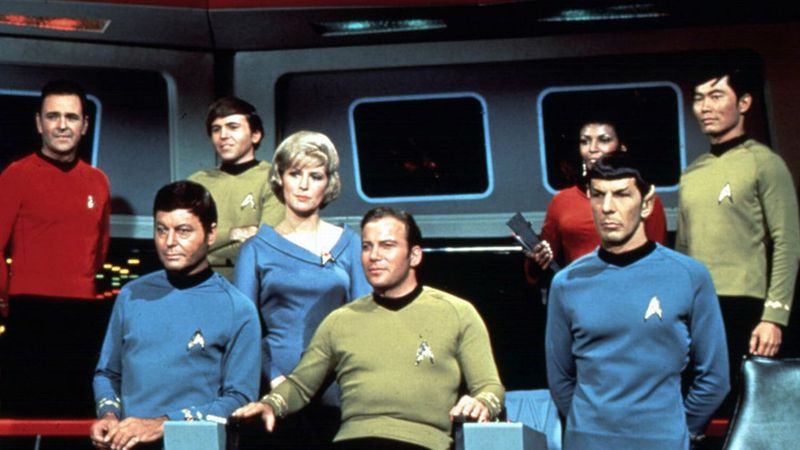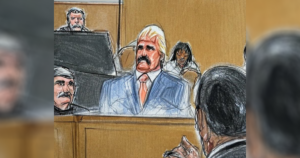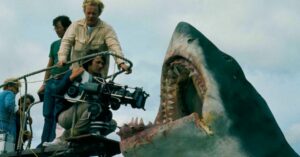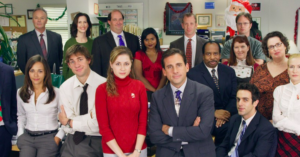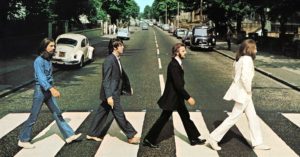In 1964, an Air Force veteran and erstwhile LAPD officer named Gene Roddenberry sold a science fiction pilot script to NBC. Called Star Trek, it envisioned an adventurous, utopian 23rd century where people of all races – even extraterrestrials – cooperated towards common ends. Though it only ran three seasons with middling ratings, Star Trek would become a cultural juggernaut, influencing everything from pop culture fandom to the phones in our pockets to real life outer space exploration. Fifty years later, the people who built this cultural monolith have come together to tell its story, including never-before-seen interview transcripts with the cast and crew we’ve lost. This is the oral history of Star Trek.
Chapter 1: Where No Man Had Gone Before
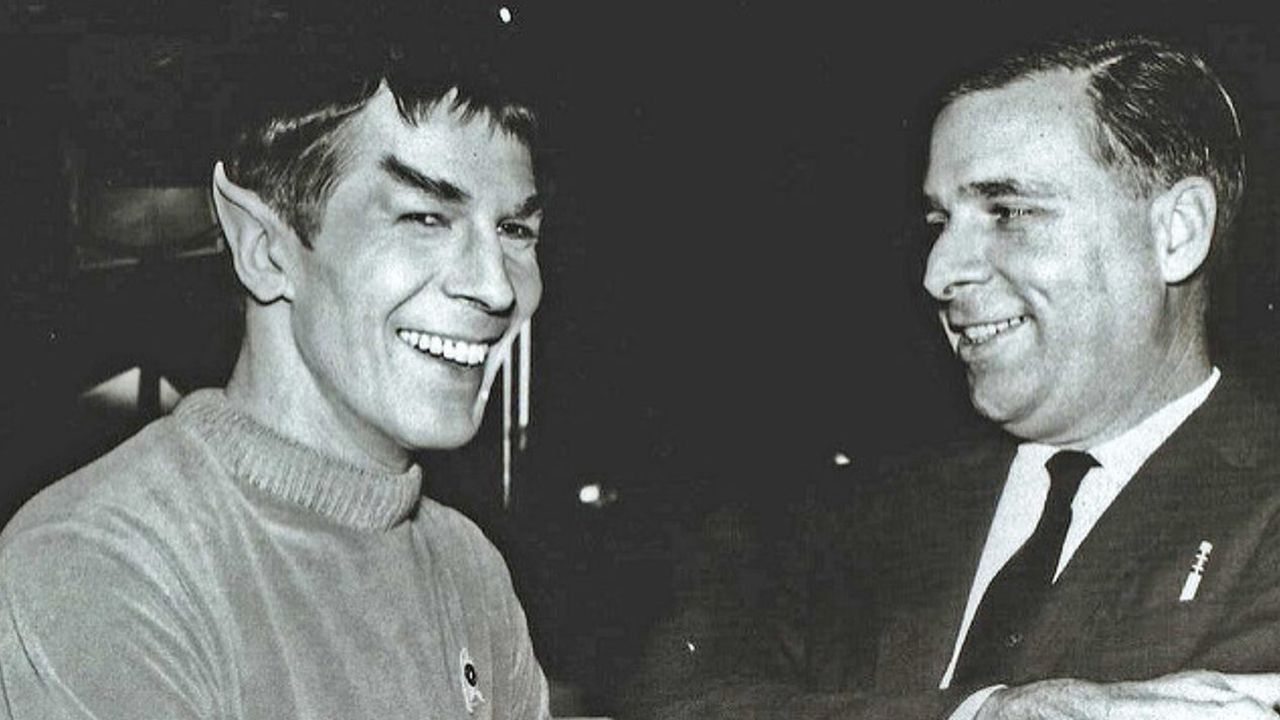
Herb Solow (former VP of production, Desilu Studios): Sixties TV came in waves. One network would put out a hit show, and the rest would pile on with imitations. ABC had recently scored big with Zoo Commando, with Charles Bronson as a Green Beret who kept falling into animal enclosures and fighting his way out with his wits and his fists. NBC had The Aquarium Strangler and CBS had Samurai Of The Barnyard, but they were all running out of live animals, and the fad was waning. So when Gene Roddenberry told me he had something new, I listened.
Rod Roddenberry (son of Gene): Dad had lived many lives before Star Trek. During World War II, he’d been decorated for crashing his bomber into a Bavarian castle full of Hitler’s most fertile mistresses. As a Pan Am pilot, he’d been promoted for crashing his cargo plane into a container ship loaded with dangerous raw eggs. As an L.A. policeman, he got commended for requisitioning a Cessna and crashing it into Robert Duvall’s garage, presumably for a good reason. Those brushes with death gave him a real appreciation for life’s possibilities.
Gene Roddenberry (executive producer—1989 interview): In outer space, there’s very little to crash into, besides planets, but you can see those coming.
Dorothy C. Fontana (story editor): Gene was an optimist. He truly believed that once people entered space and stopped colliding with objects, they would be able to set aside their differences, put on matching uniforms, and track down where other civilizations kept their mummies.
Gene Roddenberry: Earth stopped making new mummies centuries ago. Someday we’re going to run out of them, and then what? I wanted to wake people up to that, and maybe entertain them along the way.
Herb Solow: All the key elements of the show were in Gene’s original pilot script, except for a captain. The crew spends the whole episode in a state of total chaos: wrestling over the controls, slashing each other’s throats, building and worshipping idols. Spock spends the whole episode pulling wiring out of the walls to sell, before another crew member crushes his head with a stool. It was very exciting, but NBC sent it back; they said it needed focus.
Dorothy C. Fontana: We knew our captain needed to be able to command your attention. And when Bill [Shatner] walked in to audition, he got our attention.
William Shatner (actor, “Captain James T. Kirk”): I showed up to my audition in my Mickey-Mouse-trying-to-make-himself-throw-up-a-bad-plate-of-scampi T-shirt and extremely tight cowboy boots. Gene was there, wearing pretty much the same outfit, and as soon as he saw me, he stood up and shouted, “Yes! Matching! Yes!” Of all the actors they’d auditioned, he said only I understood his vision for the future, which revolved heavily around matching uniforms.
Leonard Nimoy (actor, “Mr. Spock”—2008 interview): The best decision I ever made was wearing my T-shirt that had Marvin the Martian dry-heaving into a potted ficus to my audition, because when Gene saw me wearing the same shirt as him, he just went wild. He said he had the perfect part for me: a dead-eyed slab named Spock who constantly points out people’s mistakes and sleeps in the hallway.
Matt Jefferies (production designer): We shot our pilot with basically no budget. The sets, the costumes, the matching uniforms, the mummy: We had to make them out of leftover craft-services scraps swiped from other NBC lots. The whole set stank like rotting meat, and coyotes kept swarming onto the lot, drawn from the hills by the stench.
Leonard Nimoy: We kept having to pause production to behead coyotes. It wasn’t easy, but it taught us how to work together, and how to get good leverage with garden shears.
William Shatner: If you watch that original pilot, those matching coyote-tooth necklaces we’re all wearing? Real coyotes’ teeth.
Matt Jefferies: A lot got figured out on the fly. I built the bridge of the Enterprise on a tilting stage, so the set could shake when the ship was attacked. All the stools would tumble to one end and bury Nichelle [Nichols] under a big heap, and we’d spend the next half hour digging her out. It wasn’t efficient, but you can’t fake real.
Herb Solow: NBC said they’d never seen anything like our Star Trek pilot. We had our show.
Chapter 2: These Are The Voyages
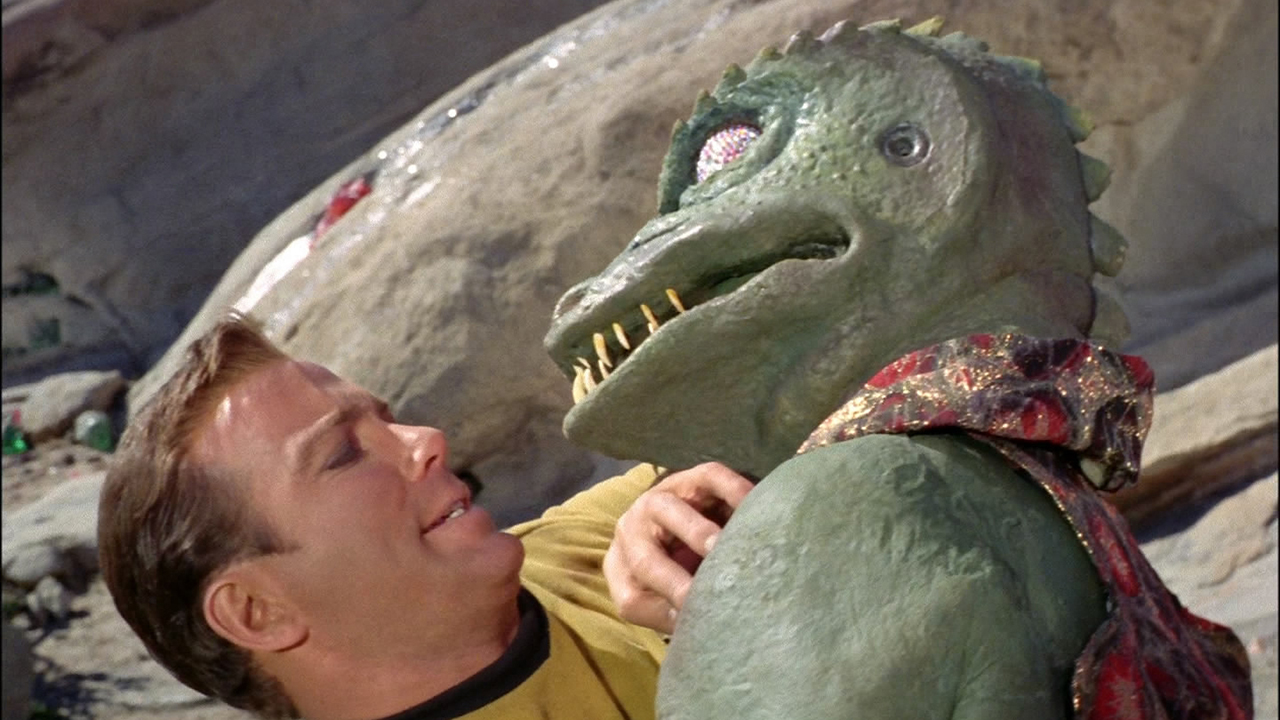
Premiering in 1966, Star Trek’s groundbreaking multiracial cast, imaginative future technology, and thought-provoking messaging, along with its spirit of chummy adventure, quickly turned it into a cult hit. And as the cast found their footing, the show found its voice.
Herb Solow: Gene always believed that we weren’t just making a show; we were showing people a blueprint for humanity’s future. Every episode had some piece of his utopian ideals in it.
Dorothy C. Fontana: While we were writing the first season, Gene called me into his office to ask me, “What brings people together?” Without thinking, I said the Olympics. “Exactly!” he said. It dawned on me: We had the opportunity to create a world where the Olympics are always happening. So we did. We worked at least three mentions into every episode.
William Shatner: I relished the challenge of finding emotion in lines like “Lt. Uhura, open a hailing frequency with the Klingon vessel, and someone do me a favor and turn on the Olympics.” It helped me grow as an actor.
George Takei (actor, “Hikaru Sulu”): Those early episodes were a blast, and they felt important. When Sulu helps Kirk build a spiral staircase for the alien race that’s spent centuries living on two unconnected floors of a big duplex in “As Above, So Below,” it wasn’t just a thrilling hour of television; it was showing what we can accomplish when we set aside our differences and do metaphors.
Nichelle Nichols (actor, “Nyota Uhura”): At first, Star Trek was just a paycheck to me. Then I got a fan letter from a young black girl in Nashville who’d seen “Computer, Call Me Ishmael.” Watching Uhura rewire the ship’s dumbwaiter into a guillotine for a bat in case one ever got in through a window, she said she realized black women really were capable of anything. I did later find out that Gene forged that letter, but I don’t think it’s any less meaningful for it.
William Shatner: Everyone remembers the action scenes: When Kirk kicks the face off the Andorian usurper and rips off its faceless head in “Unto The Breach”; when Kirk rams the Enterprise into the Star Goliath’s chest and then gets out and kicks off its head in “King David’s Lyre”; Kirk’s all-or-nothing ritualistic head-pulling-off match with She-Spock in “Isn’t That She-Spock?” But for me, the real Kirk, the idealist, comes out after the fight, when he starts mumbling “sorry” and tries to stick their head back on.
Rod Roddenberry: Star Trek didn’t really become Star Trek until “The Jester And The Concubine.” If you remember, a transporter accident fuses Dr. McCoy into the swollen belly of an enormously pregnant aquatic slug-beast. The crew is faced with a choice: Do they cut the creature open to get the doctor out, or slide a pole in there and see if they can pull him free? But Spock convinces them there’s a third way: Let nature run its course. Sure enough, two years later, the slug violently gives birth to a litter of healthy pups and a healthy, well-rested Dr. McCoy. Those were Star Trek’s core values in a nutshell: optimism, pacifism, and the benefits of live adult rebirth.
Leonard Nimoy: Those episodes were full of milestones: The first-ever televised interracial kiss. The first ghost caught on camera. The first time ceviche was prepared in the U.S. The first time I threw up and swallowed it all back down without anyone noticing. The first ghost sent to hell on camera. We were making history.
Gene Roddenberry: It was important to me that the cast really understand my vision for a better tomorrow. To that end, I made them live on the show’s set.
George Takei: We all lived together on the Enterprise from 1966 to 1969. The best part was how close our little family got. The worst part was how the door noises made us deaf.
Matt Jefferies: At Gene’s insistence, I built the ship’s automatic sliding doors to be fully functional. The machinery really made that signature “whooshing” sound you hear on the show. We did have to mix it much quieter in post-production, though, because in reality, it sounded like Godzilla’s lung being punctured.
Nichelle Nichols: The doors screamed open at 125 decibels, which is about as loud as a motorcycle revving inside a handicap porta-john.
Matt Jefferies: Revving a Harley inside a porta-potty is the caviar of thrills.
William Shatner: I didn’t mind the howling doors because they masked the sound of me narrating my wet dreams, in what I’m told is a Casey Kasem voice.
Leonard Nimoy: Spock sleeps in the ship’s hallway, so Gene made me sleep in the hallway. If someone walked down the hall to the ship’s one bathroom, every door would scream itself open. It sounded like hell’s own Pledge of Allegiance, even inside my little lean-to of discarded meal trays.
George Takei: Leonard lost most of his hearing within the first week of shooting, so he never really took direction. So the things that make Spock Spock came directly from him: his signature moves, the on-camera haircuts, the barnyard odor you could smell through the television and taste a little bit. Leonard’s why Spock became such a fan favorite.
Leonard Nimoy: The screaming doors trapped me in a prison of my own brain, and I’m still stuck there.
James Doohan (actor, “Scotty”—2003 interview): Gene never told me why I was the only one who had to keep living on set after the show wrapped. But I have faith in his vision, so here I stay.
Chapter 3: He’s Dead, Jim

Though the series gained popularity, keeping the show going proved to be no cakewalk, as ego battles between cast members and network interference threatened to bring a premature end to the Enterprise’s five-year mission.
Herb Solow: By the end of the first season, Leonard was getting hundreds of fan letters a week. Stuff like “I smelled you through my television and rubbed myself down with Timothy hay so I could smell just like you, Spock!” and “I thought it was so neat when you completed most of a front flip and landed hard on your elbows in front of the Romulan ambassador!” All that attention got under Bill’s skin.
Nichelle Nichols: Bill couldn’t stand not having the spotlight. If Chekov was giving Spock a haircut, Kirk would bust into the scene and start tugging out clumps of his own hair. When Bill found out fans were smelling and slightly tasting Spock through the TV, Kirk started turning right to camera and barking “Sniff me up—I’m marvelous!” We didn’t have the budget to shoot around him, so it all went to air.
Dorothy C. Fontana: The stereotypical Star Trek episode is, “The crew finds a planet where there’s mummies, Kirk trades Spock for his weight in mummies, the crew rigs up a last-minute solution to get Spock back.” But really, that came from Shatner pressuring us to write Spock out of the show.
George Takei: Bill would pitch a fit if he didn’t get his way. He even started changing other characters, just to flex his authority. Sulu was supposed to be a 9-foot-tall, 275-pound colossus of tomorrow, but Bill forced me to become much shorter so I wouldn’t steal focus from him.
Nichelle Nichols: DeForest Kelley was the only actor who stood up to him, so Bill had him fired. For the rest of the series, Dr. McCoy was played by a live coyote they’d caught in a flour sack, though our makeup and wardrobe team did an incredible job easing the transition.
William Shatner: I’m not the narcissistic egomaniac some people make me out to be. But without Captain Kirk, there’s no Star Trek. If I used that leverage to make the show’s star shine a little brighter, so what?
Nichelle Nichols: Right in the middle of filming “Atlas Of Yesteryear,” after a line about women’s shot put, Bill calmly reached over, popped out Leonard’s left eye, and smashed it with his other palm, like how a bartender smacks a mint leaf. Well, that was the last straw for Gene.
Gene Roddenberry: I sat the two of them down in my office. I said, “Enough of this squabbling. You’re a family; act like it. Bill, give Leonard your eye,” and he did. He popped his own eye into Leonard’s head. I said, “Bill, I’m giving you my eye, because that was very big of you,” and I did. When the cast found out about what I’d done, George donated his eye to me. Then Walter [Koenig] gave his eye to George, and so on throughout the cast, until just about everyone had someone else’s eye in their head. Ultimately, it brought us all closer together.
James Doohan: I gave my eye to the coyote in the flour sack, but Gene instructed everyone else not to give me their eye. He pointed to my head and said, “The buck stops there.” He was very principled. And at the end of the day, he’s right. One eye’s really just one fewer than two, and that’s not much difference at all.
Herb Solow: People loved Star Trek, but Gene and NBC just rubbed each other the wrong way. The network censors were always raising objections that having Spock live in the hallway sent the message that it was okay to live in the hallway, which for Gene was exactly the point.
Dorothy C. Fontana: We used to write scenes that we knew the censors would cut, to distract them from our more controversial messaging. Usually it was a scene where Sulu silently undoes his uniform and methodically works his nipple like taffy until it dangles past his belly button, and then pulls the nipple taut and plucks it like a guitar string. Once, they accidentally let it slip past, and it ended up being a really poignant climax to “The Iphigenia Complex.”
George Takei: I miss my old, concise nipple.
Leonard Nimoy: Eventually, the execs decided our ratings weren’t worth the headache, and they announced they were planning to cancel Star Trek at the end of the season. That’s when the fans started coming out in force.
Herb Solow: I was in [NBC executive] Grant Tinker’s office when a well-dressed man knocked on the door. He told Grant that recently a few very aggressive raccoons had taken over his house and forced him to flee, but that watching the crew work together to send Mussolini’s ghost to hell on Star Trek had inspired him to ally with his neighbors and chase out the raccoons with tennis rackets. Grant was very moved.
Dorothy C. Fontana: Day after day, fans from all walks of life were showing up or sending letters with stories of Star Trek inspiring them to take their home back from marauding animals. We even got a letter from Isaac Asimov saying he’d spent the last year creeping in and out of his basement window, terrified of a billy goat upstairs, until he finally defeated it using Spock’s signature “Three Taped-Together Hammers” move.
Herb Solow: NBC had never seen an outpouring of support like that. These were huge, huge fans writing long, long letters delivered by big, big mailmen. The top brass were convinced. They rescinded the cancellation.
Nichelle Nichols: We had one more season, but Gene was out. The network was sick of Gene writing in scenes where a pipe bursts on the Enterprise and drowns the crew just so he could shower on set, and Gene was sick of looking at Leonard Nimoy’s stupid fucking face.
George Takei: Without Gene, that final season just didn’t have the same spark as the rest of the show. It was definitely thrilling to see the crew finally return to Earth in the season premiere, but once Kirk realizes he’s locked out of his house and spends the rest of the season revisiting every planet we’d been to, in case he dropped his keys there, you could tell the well had run dry.
William Shatner: There’s still some magic in those last episodes. Like in the series finale, when Kirk’s given up on ever finding his keys, only to discover he can actually jimmy his laundry-room window open if Spock and Chekov give him a boost. That teamwork and ingenuity is as quintessential Trek as Kirk’s immortal final words: “It’s star treks.”
Chapter 4: To Seek Out New Life

Star Trek ended after three seasons, but its legacy continues to resonate to this day, spawning four spin-off series and 13 movies and still inspiring countless fans, dreamers, and visionaries. The story of Star Trek is still being told.
William Shatner: Star Trek wasn’t just a show; it was a whole philosophy. People don’t love Star Trek just because it’s got wacky aliens. They love it because the wacky aliens bonk each other with goofed-up widgets while a bunch of dunces in matching pajamas yammer on and on as their doors whoosh back and forth, all to make some Dr. Seuss-type point.
Leonard Nimoy: I’m proud to have played Spock. Over the years, I’ve heard from so many fans who grew up thinking they’d go their whole lives without ever seeing Spock on television. Now, I’m told, you can see Spock in a movie, and even on some paper plates.
George Takei: Even 50 years later, people still come up to me on the street, plant their feet in a wide stance, point at me with both hands, and violently dislocate their jaw so their mouth dangles slack. They didn’t do that before I was on Star Trek, so I have to assume it’s related.
Nichelle Nichols: My first Star Trek convention was a little overwhelming. It was surreal seeing fans dressed up as our nude bodies, and you couldn’t walk 10 feet without someone coming up and begging you for one of your bones for their reliquary.
George Takei: I once saw one of my bones sell on eBay for over $6,000. It’s flattering, but at the same time, jeez, you know? It’s just a bone.
William Shatner: Our fans love Star Trek so much that, in order to celebrate it, they’re willing to be around people so similar to them that they could switch lives without anyone ever noticing or caring if they did. I don’t understand it, but I admire it.
James Doohan: Gene said fan mail would only go to my head, so I’ve never really had any contact with them, but he’s assured me they wouldn’t have much interest in meeting a one-eyed man who lives in the rafters of a soundstage.
Matt Jefferies: When we were designing the technology of Star Trek, we never dreamed it would inspire a generation of engineers to cop out and steal our best fucking ideas. Had we known so many smart, capable young people nursed the heart of a jackal in their breast, we would have dropped in on a few MIT parties with Louisville sluggers and scored their janitors some overtime pay, if you know what I mean.
Sir Richard Branson (founder, Virgin Group): Growing up, I was obsessed with Star Trek, particularly the Replicator, a device that creates a very hot onion wrapped in foil out of nothing but an onion and some foil. For years, I threw myself into designing and testing a real-life version of the Replicator. I never did bring my dream to fruition.
Ridley Scott (director, Blade Runner): Star Trek gave me the idea for Chewbacca, but then it turned out someone else did Chewbacca first.
Herb Solow: Ultimately, Star Trek was about asking people what they wanted the future to look like. Will we learn from the past and stride hand in hand towards a brighter tomorrow, or will we become a society that worships enormous, veiny udders that dangle from silver blimps and drip salty gray milk, like the inhabitants of Cocytus IV in “Look To The Skies”?
Gene Roddenberry: When I die, I want people to say, “Now that Gene Roddenberry’s dead, I’m thinking we should do Star Trek for real, with all the computers and shit.” And then I’m hoping someone else says, “Way ahead of you,” and yanks a sheet off where they’ve built a gigantic computer that dispenses so much money that money gets abolished, and additionally, the computer is a woman. I truly hope I made that clear enough, or this was all for nothing.
William Shatner: As long as I live, I’ll never forget what I wore on Star Trek. And if I ever do, I can easily look it up.

